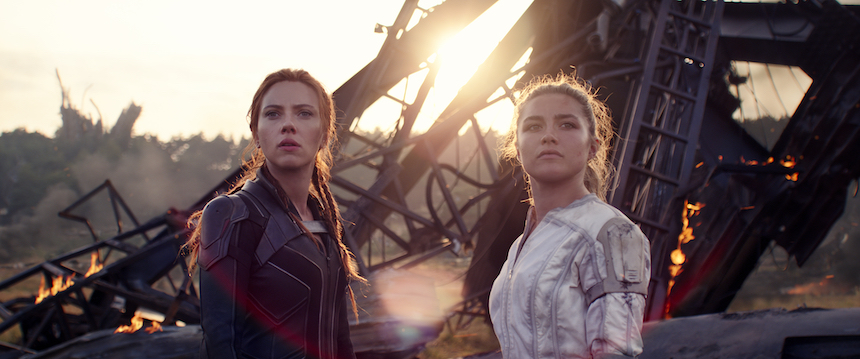Review: BLACK WIDOW, Once More Into the MCU Breach
Scarlett Johansson, Florence Pugh, Rachel Weisz and David Harbour star in the action adventure, directed by Cate Shortland.

A rarity among the sprawling, multiplex dominant franchises of the last decade, Black Widow, the 24th entry in the ongoing, never-ending Marvel Cinematic Universe (MCU) serves a triple function, as a sequel (Captain America: Civil War), as a prequel (Avengers: Infinity War), and as a long-awaited spinoff of a popular, pre-established character long deserving of a standalone film.
Black Widow also serves as a much-deserved, if melancholic good-bye to the title character, Natasha Romanoff (Scarlett Johansson), eleven years after her pivotal introduction in Iron Man 2 and Black Widow’s subsequent elevation to co-leading status in 2012’s Avengers and more importantly, Captain America: The Winter Soldier just two years later. Those two roles also promoted Romanoff from a supporting character to the MCU’s stealth MVP, its figurative heart and literal soul.
Borrowing several pages from The Americans, the long-running cable series about a Russian family hiding in plain sight in Reagan-Era America, Black Widow opens in the distant past (1995) as a young Natasha (Ever Anderson), her sister, Yelena (Violet McGraw), and their parents, Alexei (David Harbour) and Melina (Rachel Weisz), enjoy a seemingly idyllic summer evening in Ohio. That idyll, however, doesn’t last long.
Alexei and Melina are Russian sleeper agents and Natasha and Yelena their non-biological “daughters” used as cover for a super-secret mission that goes sideways within minutes of the audience meeting Natasha’s faux-family. Pursued by government agents, they flee, setting up a not unfamiliar chase through the streets of the unnamed Ohio town, an unlikely escape by airplane to Cuba, and a forced separation of Natasha’s faux-family that lasts two decades.
In the “present” (pre-Avengers: Infinity War), a grown-up Yelena (Florence Pugh), like her sister trained as a Black Widow assassin by the so-called Red Room, a covert, Russian-sanctioned operation stretching back decades, engages in some nifty, Jason Bourne-by-way-of-Ethan-Hunt acrobatics, tracking down a rogue Black Widow before said rogue Black Widow helps to remove the chemically induced mind control that makes Yelena and the other Black Widows the unwilling puppets of General Dreykov (Ray Winstone), the equivalent of the Red Room’s all-powerful CEO. That, in turn, marks Yelena as a rogue Black Widow too, forcing her to go underground.
When we catch up with Natasha, she’s also in fugitive escape mode, targeted by General Ross (William Hurt), for violating the Sakovia Accords that banned non-government sanctioned superhero antics. Natasha eludes Ross and his men easily, absconding to an off-the-grid safe house in Norway with the assistance of Rick Mason (O-T Fagbenle), a black marketer/fixer with an obvious crush on Natasha and a fondness for napping. It doesn’t take long, though, before Natasha opens a package from Yelena (hiding in Hungary) containing Black Widow’s MacGuffin, anti-mind control serum that will free the other Black Widows from Dreykov’s draconian control.
Hungary gives Natasha the opportunity to reunite with Helena after 21 years, but not before a knock-down, drag-out fight so Helena can work out her long simmering anger and resentment towards her “sister.” It also serves as the obligatory action scene every 10-12-minutes rule typical of 21st-century superhero and non-superhero action films. Fight aside, the sisters team up with one goal in mind: Taking down Dreykov and permanently closing the Red Room.
That might be the endpoint plot-wise, but Black Widow’s real focus is reuniting Natasha and Yelena with Alexei, gone to seed while he languishes in a Russian jail, and Melina, apparently living peacefully on a farm outside St. Petersburg while she continues longtime experiments on mind control and pigs. The reunion goes as well as expected (i.e., not well at all), with Natasha and her faux-family falling into old habits of behavior, including finger-pointing/blame-shifting, bitterness, and disappointment (like any family, real or imagined), primarily at Alexei and Melina, at one time loyal instruments of the Russian state, for abandoning their faux-daughters to Dreykov and the Red Room.
On its own, that particular scene mixes humor with pathos, hinting at paths left unfollowed, and lives (and relationships) left unfulfilled. For some, it might feel like a momentum-stopper, but those glimpses at Natasha and her faux-family, especially with Yelena reverting into the little girl she was once and Alexei into the well-meaning, if dunderheaded, parental figure, with Melina as the stern, borderline authoritarian mother, help to deepen Natasha’s backstory and create a level of relatability necessary for Black Widow’s overlong, somewhat bloated third act where little things like common sense, plot logic or the laws of physics give way to a sense of deja-vu and superheroics straight out of Captain America: The Winter’s third act.
Even with an over-familiar third act, Black Widow still manages to hit a reasonable number of seemingly genuine, authentic emotional beats, with Natasha and her faux-family always front-and-center. That occasionally leaves Natasha, if not in the background, then sharing screen time with her faux-family, but it’s a minor, ultimately non-consequential issue, though Marvel being Marvel (i.e., always looking forward to the next franchise entry), Black Widow appropriately feels like both a send-off for a beloved character, Natasha, and the introduction of another, Yelena, meant to replace her in the MCU’s recently launched Phase 4 and beyond.
Black Widow will be released simultaneously in movie theaters and on Disney+'s Premier Access service on July 9.
Black Widow
Director(s)
- Cate Shortland
Writer(s)
- Jac Schaeffer (story by)
- Ned Benson (story by)
- Eric Pearson (screenplay by)
- Stan Lee (based on the Marvel comics by)
- Don Heck (based on the Marvel comics by)
- Don Rico (based on the Marvel comics by)
Cast
- Florence Pugh
- Scarlett Johansson
- Rachel Weisz
- David Harbour







